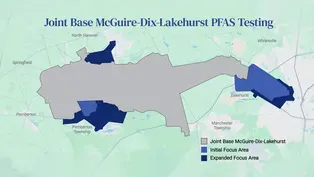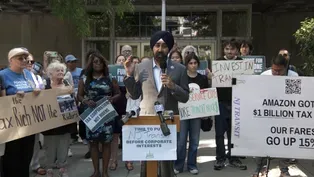NJ Spotlight News
US Supreme Court preserves access to abortion pill
Clip: 6/13/2024 | 5m 23sVideo has Closed Captions
Interview: Kim Mutcherson, professor of law at Rutgers University-Camden
In a unanimous decision on Thursday, the U.S. Supreme Court maintained access to the abortion pill mifepristone and rejected a lawsuit brought by a group of doctors who had challenged the Food and Drug Administration’s approval of the medication.
Problems with Closed Captions? Closed Captioning Feedback
Problems with Closed Captions? Closed Captioning Feedback
NJ Spotlight News is a local public television program presented by THIRTEEN PBS
NJ Spotlight News
US Supreme Court preserves access to abortion pill
Clip: 6/13/2024 | 5m 23sVideo has Closed Captions
In a unanimous decision on Thursday, the U.S. Supreme Court maintained access to the abortion pill mifepristone and rejected a lawsuit brought by a group of doctors who had challenged the Food and Drug Administration’s approval of the medication.
Problems with Closed Captions? Closed Captioning Feedback
How to Watch NJ Spotlight News
NJ Spotlight News is available to stream on pbs.org and the free PBS App, available on iPhone, Apple TV, Android TV, Android smartphones, Amazon Fire TV, Amazon Fire Tablet, Roku, Samsung Smart TV, and Vizio.
Providing Support for PBS.org
Learn Moreabout PBS online sponsorshipwe begin with the unanimous decision today by the US Supreme Court to maintain access to the abortion pill mffa pistone rejecting a lawsuit brought by a group of doctors who challenged the Food and Drug administration's approval of the medication which last year alone was used in nearly 2third of all abortions in the US meaning it'll remain widely available to the public including by mail in writing the opinion for the Court Justice Brett Kavanaugh said while plaintiffs have quote sincere legal moral ideological and policy objections to abortion and the fda's regulations of it quote the federal courts are the wrong forum for addressing the plaintiff's concerns about fda's actions the case put abortion access back in the spotlight for the first time since the Court's conservative majority voted to overturn roie Wade in 2022 and is considered a major setback for the anti-abortion movement but is this the end Kim Mutcherson is a professor of law at Rutgers law school and she joins me to help answer that question Kim appreciate your Insight on a day like this I want to start with How likely is it that other plaintiffs will Mount challenges despite this ruling oh I would say it's 100% likely um and largely because we know that you know 60 plus per of abortions in this country are medication abortions at this point and so if you are part of an organization of folks who are trying to make it impossible or much more difficult to get an abortion in the United States then you have to attack medication abortion um and this is this is the way that you do that so even though this was a resounding loss um we already had states that are trying to intervene in this case that have successfully intervened in this case so we'll see what happens with that and then there might be other folks who later on decide well if th that case loses I will bring yet another case um to try to figure out how to make medication abortion inaccessible so the court said listen this group didn't have legal standing that's why we're throwing this out but did it actually rule on the safety of the pill the morality of the pill or any of the issues where that were also at the center of this lawsuit not at all any any lawsuit starts with a question of standing you have to be somebody who has um a legally cognizable interest in a particular set of circumstances and here we had um people who are healthc care providers who have nothing to do with abortion they don't provide abortions they don't uh prescribe M A pry Stone and they had this very tenuous claim that they were making that they might at some point find themselves in a position where they had to provide care for somebody who had had a medication abortion and shows up in an emergency room and needs help from them um and what the court said essentially is look there are already federal laws and state laws that protect people who have conscious objections to providing abortions um from having to do that so there just wasn't a good link there and then there was also an organizational plaintiff and they said the same thing with the organizational plaintiff you don't have a deep enough interest in what's happening in this case um to show that you would be injured if mff prone stays on the market and yet Justice Kavanagh in writing the opinion said you know listen this can still be presented these concerns can still be presented to the president to Congress to the FDA there's nothing stopping you even from presenting your concerns to Citizens so what does that mean now moving forward so essentially what that means is if you if you think that you are cut off from access to the courts which I don't think is going to be the case as I said we still have these states who've intervened in this particular lawsuit um if you can't do it that way then go to Congress see if Congress can do something about it maybe they can you know pass a bill pass a law that makes it harder to access um medication abortion um and if Congress won't do something maybe you go to the president and seek an executive order um but all of this raises really huge questions about separation of powers right it's all about sort of our is each branch of the federal government sort of staying in its Lane right and the Supreme Court said if we don't have a real case then then it then it's not in our lane and we can't deal with it so you can either go to the political process or maybe you can just let the FDA do its job very quickly Kim what role if any does uh individual state law have on impact to access um New Jersey of course the Attorney General said today will continue to uh be a progressive state in the way that they have been that it has been but how does state law impact access here um so we already saw uh Louisiana deciding to make um if a pry Stone which is the primary drug that is used in medication abortion um to make it a controlled substance um as a way to try to make having access to myff Prestone even more difficult um so we might see other states continuing to go down that line and we're already seeing states trying to make it difficult for people to mail pills across state lines or to travel across state lines to get pills so there's definitely state law that's going to be involved here as well Kim Mutcherson Kim Mutcherson is a professor of law at Rutgers Law School Kim thanks so much thank you it's always good to talk to you [Music]
'Forever chemicals' near Joint Base raise immediate worries
Video has Closed Captions
Clip: 6/13/2024 | 4m 25s | US Air Force hosts open house for those living near McGuire-Dix-Lakehurst (4m 25s)
New Jersey Hall of Fame set to open at American Dream
Video has Closed Captions
Clip: 6/13/2024 | 3m 53s | Greeting visitors will be holograms of inductees like Danny DeVito (3m 53s)
Pressure mounts for business tax to help fund NJ Transit
Video has Closed Captions
Clip: 6/13/2024 | 4m 27s | Funding sought as riders face 15% fare hike (4m 27s)
WSJ reporter Evan Gershkovich to stand trial in Russia
Video has Closed Captions
Clip: 6/13/2024 | 4m 32s | Interview: Paul Beckett, assistant editor for the Wall Street Journal (4m 32s)
Providing Support for PBS.org
Learn Moreabout PBS online sponsorshipSupport for PBS provided by:
NJ Spotlight News is a local public television program presented by THIRTEEN PBS















